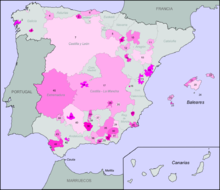Valles de Sadacia
| Wine region | |
 Valles de Sadacia VdlT in the region of La Rioja | |
| Type | Vino de la Tierra |
|---|---|
| Country | Spain |
Valles de Sadacia is a Spanish geographical indication for Vino de la Tierra wines located in the autonomous region of La Rioja.[1] Vino de la Tierra is one step below the mainstream Denominación de Origen indication on the Spanish wine quality ladder.[2]
Only white wines are included in Valles de Sadacia. Three types are considered: dry (seco), semi-dry (semiseco or semidulce) and sweet (dulce).
History[]
The Valles de Sadacia geographic indication was created in 2003, on the initiative of the Agricultural Authorities of the Government of La Rioja, in collaboration with , a winery specialized in the production of quality white wine.[3] The name Sadacia derives from Sádaco, the ancient Roman name of the river Cidacos.
Geography[]
Valles de Sadacia comprises four of the seven river valleys that cross La Rioja: the rivers , , Cidacos and Alhama. This area receives the lowest rainfall and most hours of sunlight in the La Rioja region.
The following municipalities are covered: Agoncillo, Aguilar del Río Alhama, Albelda, Alberite, Alcanadre, Aldeanueva de Ebro, Alfaro, Arnedillo, Arnedo, Arrúbal, Ausejo, Autol, Bergasa, , Calahorra, Cervera del Río Alhama, Clavijo, Corera, Cornago, El Redal, El Villar de Arnedo, Galilea, Grávalos, Herce, Igea, , Leza de Río Leza, Murillo de Río Leza, Muro de Aguas, Nalda, Ocón, Pradejón, Préjano, Quel, Ribafrecha, Rincón de Soto, , Santa Eulalia Bajera, Tudelilla, Villamediana de Iregua, Villarroya and Logroño
Authorized Grape Varieties[]
Wine bearing the Vino de la Tierra Valles de Sadacia indication on their labels must be made with at least 85% grapes of the white varieties Moscatel de Grano Menudo or Moscatel de Alejandría. Viura, Malvasia and Garnacha blanca are also allowed.
Technical requirements[]
- Maximum planting density: minimum 2,850 vines/hectare
- Maximum grape production: 10,000 kg/hectare
- Maximum yield: 70% (70 L must per 100 kg grapes)
References[]
- ^ http://www2.larioja.org/pls/dad_user/G04.bor_home[permanent dead link] VdlT Regulations, in Spanish
- ^ http://www.vallesdesadacia.com/ingles/index.html Official webpage, in English
- ^ http://www.castillodemaetierra.com/english/index.php Castillo de Maetierra winery website. In English
- Wine regions of Spain

